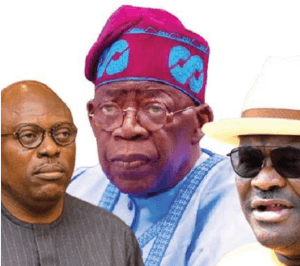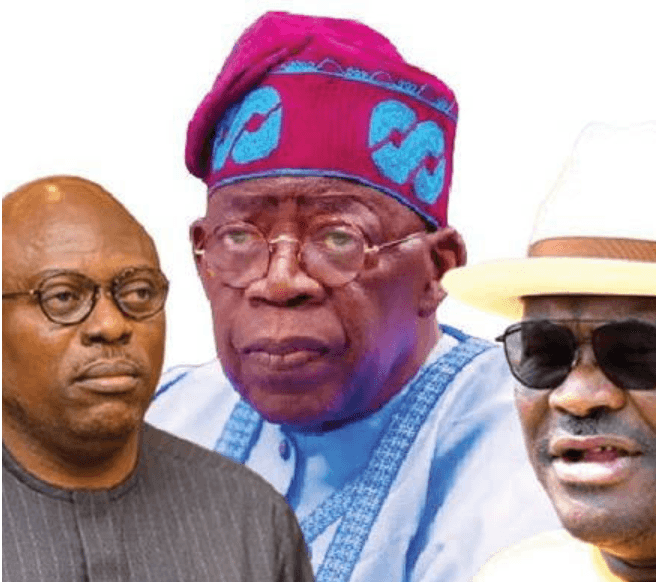Emergency Rule: Soldiers, Tanks Move into Rivers State Govt House
By Parrot Newspaper
Tension has gripped Rivers State following President Bola Tinubu’s declaration of a state of emergency, leading to the deployment of soldiers and military tanks to the Rivers State Government House in Port Harcourt. The move, which has effectively removed Governor Siminalayi Fubara and his deputy, has sparked controversy, raising concerns about constitutional overreach and political maneuvering.
Military Takes Over Government House
Following Tinubu’s announcement on Tuesday evening, troops stormed the Government House, securing the premises as an Armored Personnel Carrier (APC) was stationed at the entrance. Witnesses reported seeing several Sports Utility Vehicles (SUVs) with their headlights on, signaling heightened military activity.
An insider revealed that Governor Fubara was still inside his official residence when the soldiers arrived, though it remains unclear whether he intends to leave or resist. The sight of heavily armed soldiers sent shockwaves through the city, with many residents rushing home, fearing unrest.
Tinubu Justifies Emergency Rule
In his national broadcast, Tinubu cited escalating political tensions and a breakdown of governance as the reasons for invoking Section 305 of the 1999 Constitution to impose emergency rule.
“Having soberly reflected on and evaluated the political situation in Rivers State… it has become inevitably compelling for me to declare a state of emergency,” Tinubu stated.
He announced the immediate suspension of Fubara, his deputy, and all members of the Rivers State House of Assembly for six months, appointing retired Vice Admiral Ibokette Ibas as the state’s interim administrator.
“This intervention will help restore peace and order in Rivers State and ensure that governance is not held hostage by political actors,” he added.
Explosions, Security Concerns Precede Declaration
The emergency declaration came just hours after twin explosions rocked two oil pipelines in Rivers State. The first blast occurred late Monday night at a section of the Trans Niger Pipeline in Bodo, Gokana Local Government Area, while the second was reported Tuesday morning at an oil manifold in Ogba-Egbema-Ndoni Local Government Area.
Authorities have yet to confirm whether these incidents were acts of sabotage linked to the state’s political crisis, but two suspects have been arrested as investigations continue.
Fubara Reacts, Calls for Calm
In his first response to the suspension, Fubara urged Rivers people to remain peaceful and law-abiding. He accused lawmakers loyal to former Governor Nyesom Wike of frustrating all attempts to restore order.
“Yes, we have political disagreements, but governance has continued, salaries have been paid, and projects are being executed. Rivers State is safe, secure, and peaceful under our watch,” Fubara stated.

He vowed to challenge the suspension through legal and institutional channels, insisting that democracy must prevail.
Wike vs. Fubara: A Power Struggle Gone Too Far?
The deepening political crisis in Rivers has long been a battle between Fubara and his predecessor, Nyesom Wike, now the Minister of the Federal Capital Territory (FCT). The rift escalated when 27 lawmakers defected from the Peoples Democratic Party (PDP) to the ruling All Progressives Congress (APC) and initiated impeachment proceedings against Fubara.
While Tinubu’s emergency declaration is framed as a response to security concerns, many believe it is a strategic move to consolidate political power. Analysts argue that the decision may set a dangerous precedent for removing elected officials through executive orders.
Legal Questions and Public Outrage
The declaration has triggered heated legal debates. Constitutional lawyer Femi Falana (SAN) criticized Tinubu’s move, stating, “A state of emergency does not give the President the power to suspend elected officials. This is unconstitutional and must be challenged.”
Public reactions have been mixed, with some supporting the intervention to restore order, while others see it as an assault on democracy. Protests have erupted in parts of Port Harcourt, with youths blocking the East-West Road and demanding Fubara’s reinstatement.
What’s Next for Rivers State?
With military control now in place and an interim administrator set to take over, the coming weeks will determine whether Tinubu’s decision stabilizes the state or fuels further resistance. The situation remains fluid, and all eyes are on the National Assembly, the judiciary, and the people of Rivers as the crisis unfolds.
—
Stay with Parrot Newspaper for the latest updates—News That Talks to You.


